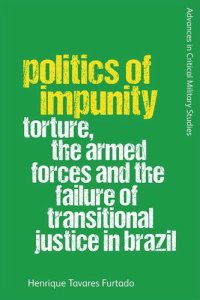
Ebook: Politics of Impunity: Torture, The Armed Forces and the Failure of Justice in Brazil
Author: Henrique Tavares Furtado
- Year: 2022
- Publisher: Edinburgh University Press
- Language: English
- pdf
Analyses the struggles for accountability and the resurgence of militarism in Brazil
- Provides an extensive analysis of Brazilian official documents of the truth commission, including semi-structured interviews with activists and practitioners, still unseen in English
- Opens a pathway for exchange and comparison between representations of militarism and different strategies for resisting military violence, from both the Global North and the Global South
- Reveals non-Eurocentric ways to represent and think about militarism by investigating the work of local scholars and practitioners in Brazil
- Explores links between debates on critical militarism studies and processes of truth and reconciliation
- Focuses on the concept of resistance to militarised violence, an increasingly important topic in the social sciences
- Provides one of the first initial insights into the rise of the far-right in Brazil and the re-emergence of historical revisionism about the military past
Politics of Impunity investigates the failure of the anti-impunity agenda in Brazil, from the release of the truth commission report denouncing the crimes of the military regime (1964-1985) in 2014, to the election of the former-paratrooper and far-Right leader Jair Bolsonaro in 2018. Connecting debates on critical military studies, transitional justice and memory studies, the book moves beyond the conditions of implementation of accountability measures. It examines the conditions of possibility of the global anti-impunity agenda: when, how and why the question of impunity came to dominate debates on large-scale political violence.
Drawing lessons from the Brazilian case, the book provides a new reading of transitional justice, investigating alternative ways of understanding militarism in the absence of warfare. It reveals the ways in which narratives of accountability and the memory of militarism work to demarcate and restrict what counts as unacceptable violence, who counts as victims/perpetrators and what counts as reasonable forms of justice and resistance.